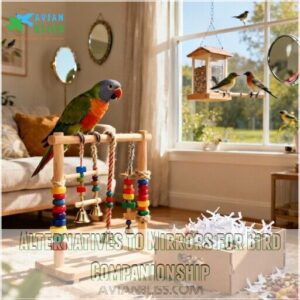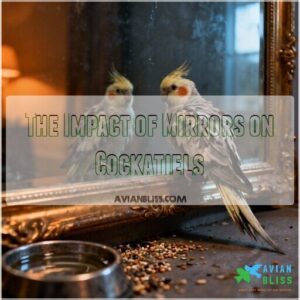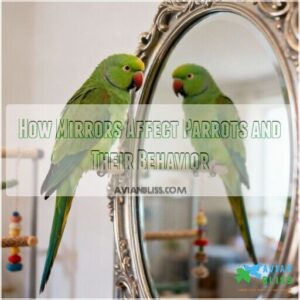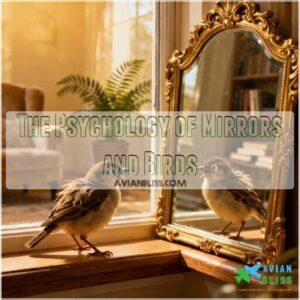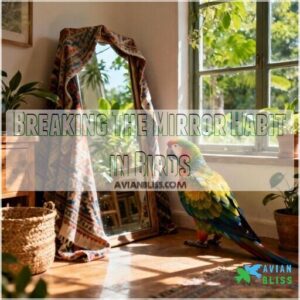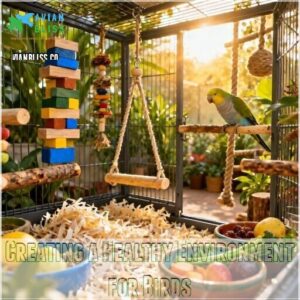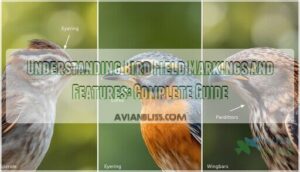This site is supported by our readers. We may earn a commission, at no cost to you, if you purchase through links.

Mirrors trick birds into forming one-sided bonds with their own reflections, triggering territorial aggression, obsessive behaviors, and social isolation that can derail their emotional development. Unlike humans who quickly recognize themselves, birds can’t distinguish between reflection and reality, leaving them trapped in a cycle of confusion and frustration.
The consequences reach beyond simple entertainment gone wrong—mirrors can interfere with your bird’s ability to form genuine relationships, communicate effectively, and develop the cognitive skills they need for a healthy life.
Table Of Contents
- Key Takeaways
- Mirrors and Birds: a Bad Combination
- The Importance of Socialization for Birds
- Alternatives to Mirrors for Bird Companionship
- The Risks of Mirrors for Specific Bird Species
- The Psychology of Mirrors and Birds
- Breaking The Mirror Habit in Birds
- Creating a Healthy Environment for Birds
- Frequently Asked Questions (FAQs)
- Is mirror harmful to birds?
- Why can’t birds look in mirrors?
- What happens when a bird looks in the mirror?
- Do mirrors keep birds away?
- Can birds distinguish between their reflection and another bird?
- How do mirrors affect birds during breeding season?
- Are all bird species equally affected by mirrors?
- Can mirrors cause physical harm to birds?
- How can I protect my bird from mirror-related stress?
- Do mirrors cause physical injuries in birds?
- Conclusion
Key Takeaways
- Birds can’t recognize their own reflection in mirrors, which causes them to form one-sided bonds with what they perceive as a real companion, triggering territorial aggression, obsessive behaviors, and social isolation that prevents them from developing genuine relationships with other birds or humans.
- Mirror exposure leads to serious physical and psychological harm, including weight loss (up to 12% in severe cases), increased aggression (affecting 42-45% of exposed birds), stress-related hormonal imbalances, and injuries from repeatedly attacking their reflection.
- Proper socialization through real interaction—whether with human caregivers, companion birds, or enrichment activities like puzzle toys and foraging games—is essential for birds’ cognitive development, communication skills, and emotional well-being in ways that mirrors can never provide.
- Breaking the mirror habit requires gradual removal combined with environmental enrichment, positive reinforcement training, and providing varied experiences that challenge your bird’s mind and satisfy their natural instincts for exploration and social connection.
Mirrors and Birds: a Bad Combination
Regarding birds and mirrors, what seems harmless can actually cause confusion and stress. These shiny objects can change the way a bird sees its world and reacts to its own reflection.
Here are some setups that can help you sidestep these issues.
Why Mirrors Create a False Sense of Reality
When you hang a mirror in your bird’s cage, it’s easy to forget that what feels like a harmless decoration can leave your bird living in a world of make-believe. Birds can’t pass the mirror test. The image causes perception discrepancy and reflection confusion, resulting in:
- Reality distortion that triggers cognitive dissonance
- Behavioral impact through increased obsessive behaviors
- Mistaken selfrecognition as a rival
- Disrupted cognitive ability, making natural instincts harder to follow
The Impact on Social Development in Birds
Take away real flock-mates and your bird’s world gets a little smaller. With mirrors, birds mistake reflections for companions, but wind up stuck in social isolation.
This habit can stunt communication skills and weaken their sense of Social Hierarchy. Instead of healthy Prosocial Behaviors or playful interaction, you often see Reduced Interaction, repetitive behaviors, and missed opportunities for true connection.
Most birds lack self-recognition abilities, mistaking their reflection for another bird.
Territorial Behavior and Isolation in Birds
It doesn’t take long for a bird facing its own reflection to turn from curious to fiercely protective, treating that shiny "intruder" like a real rival trying to invade its space.
This mirror-induced aggression triggers territorial defense behaviors—lunging, pecking, constant vocalizations—that drain your bird’s energy and push it toward social isolation.
The reflection obsession becomes all-consuming, leaving less room for healthy interaction with you or other birds, ultimately leading to behavioral problems and social deprivation that affect your bird’s overall well-being.
The Importance of Socialization for Birds
Birds aren’t meant to live in isolation—they’re social creatures that thrive on interaction, whether that’s with their flock, their human caregivers, or both. Without proper socialization, your bird can develop stress-related behaviors that affect both their mental and physical health.
Here’s what social interaction does for your bird—it shapes their behavior, heads off common issues, and deepens the bond you share.
How Social Interaction Affects Bird Behavior
Your bird’s social life shapes everything from their daily habits to their long-term health. Social interaction is the backbone of healthy avian behavior—it teaches communication skills, reduces stress, and even boosts foraging success. Studies show social species spend roughly 6.6% of their time with specific flock members, and these bonds directly impact survival and emotional welfare. When birds engage with you or other birds, they learn social learning patterns that prevent loneliness and abnormal behaviors.
Social interaction brings several key benefits:
- Strengthens communication through songs, calls, and body language
- Reduces anxiety and improves emotional welfare in captive settings
- Teaches foraging success through observing and interacting with others
- Establishes healthy dominance hierarchies without excessive aggression
- Enhances migration outcomes and survival through cooperative behaviors
Without regular social contact, your bird may struggle with parrot social needs, leading to stress-related issues that mirrors only worsen by creating false companionship. As a side note, social bird species are often less competitive.
The Role of Socialization in Preventing Behavioral Problems
When you skip proper socialization, you’re opening the door to a host of behavioral problems that could have been easily prevented. Birds deprived of social interaction often develop screaming habits, feather plucking, and aggression—signs of loneliness and stress.
Proper socialization benefits include teaching your bird healthy communication and reducing isolation that leads to obsessive behaviors. Use interaction techniques like playdates with other birds or bonding activities during daily routines.
These alternatives to mirrors for bird companionship provide real social enrichment. Behavioral reinforcement through positive experiences helps your bird develop confidence and emotional stability. Without socialization, mirrors become tempting but harmful substitutes for genuine connection.
Strengthening The Bond Between Birds and Owners
Building a strong bond with your bird isn’t just about meeting basic needs—it’s about creating trust through consistent, meaningful interaction that replaces the empty companionship a mirror pretends to offer.
Trust building happens through shared activities like training sessions where positive reinforcement strengthens communication cues. Understanding your bird’s body language shows empathetic understanding, turning daily pet bird care into genuine avian enrichment that fosters healthy socialization far better than any reflection ever could.
Alternatives to Mirrors for Bird Companionship
If you’ve realized mirrors aren’t the right fit for your bird, you’re probably wondering what options actually work.
The good news is there are several proven alternatives that satisfy your bird’s need for companionship without the risks mirrors bring.
Here are some practical ways to keep your feathered friend happy and mentally engaged.
Providing Toys and Enrichment for Birds
Your bird’s cage doesn’t need to be a boring box—it can become a playground that challenges their mind and satisfies their natural instincts to forage, explore, and problem-solve.
Rotate toys weekly to prevent boredom and keep your bird engaged. Puzzle feeders and foraging opportunities mimic natural feeding behaviors, while shredding toys offer sensory enrichment and stress relief.
Choose safe materials like untreated wood, natural fibers, and bird-safe dyes. These enrichment activities provide excellent alternatives to mirror stimulation, supporting healthy avian enrichment without the behavioral risks mirrors create.
Spending Quality Time With Your Bird
Nothing replaces the irreplaceable bond you build through one-on-one interaction—your presence is the most powerful enrichment tool you can offer your bird. Daily bonding activities strengthen trust and support healthy socialization far better than mirrors ever could.
Games and training that strengthen your bird’s wellbeing:
- Foraging play: Hide treats in toys or shared spaces to encourage natural problem-solving behaviors.
- Positive reinforcement training: Teach tricks like stepping up or waving to build confidence and communication skills.
- Supervised exploration: Allow your bird to investigate safe enrichment options outside the cage while you supervise.
The Benefits of Companion Birds
If you’ve ever watched a bird bounce joyfully off the walls when meeting a new friend, you already know what solitary living has been costing them. Companion birds provide emotional support and stress reduction that mirrors simply can’t replicate.
When birds have companions, their communication skills sharpen, they get natural playtime with their own species, and their minds stay active—all of which adds up to better overall health.
| Benefit | Solo Bird | With Companion |
|---|---|---|
| Social Interaction | Limited to humans only | Daily species-appropriate socialization |
| Stress Levels | Elevated from isolation | Reduced through natural bonding |
| Communication Skills | Underdeveloped vocalizations | Enhanced through peer learning |
| Overall Wellbeing | Prone to behavioral issues | Thriving mental and physical health |
Joining a Bird Club for Socialization
Think of bird clubs as playgrounds for your parrot—spaces where both of you can learn, grow, and connect with others who understand the unique joys and challenges of life with birds. These communities offer invaluable support through shared experiences and breed-specific guidance that can transform your bird’s social life.
Bird club membership gives you:
- Expert guidance on socialization techniques, enrichment activities, and parrot enrichment and toys suited to your bird’s needs
- Organized playdates where pet birds interact safely under supervision, building natural communication skills
- Club activities like workshops and outings that expand your bird community connections and knowledge base
The Risks of Mirrors for Specific Bird Species
Not all birds react to mirrors the same way. Some species are more vulnerable to the stress and confusion that reflections cause.
Here’s what happens when cockatiels, parrots, and other common pet birds encounter mirrors.
The Impact of Mirrors on Cockatiels
Cockatiels face serious risks when exposed to mirrors. Over 60% of their day may be spent fixated on their reflection, leading to social isolation from you and other birds. This mirror obsession drives aggression—up to 45% of cockatiels with constant mirror access bite more frequently.
Health risks mount as these birds neglect food and water, sometimes losing over 12% of their body weight. Mirror-induced aggression and hormonal imbalance affect nearly a quarter of birds, while cognitive effects include reduced problem-solving skills and slower learning.
Safe alternatives like rotating toys, puzzle feeders, and interactive whistle training can restore normal behavior—68% of mirror-obsessed cockatiels improve with enrichment-focused intervention.
| Mirror Impact | Observable Effect |
|---|---|
| Time spent on reflection | Over 60% of waking hours |
| Aggression increase | 45% develop biting behaviors |
| Weight loss in severe cases | Exceeds 12% of body mass |
| Hormonal disorders | Affects 24% of birds |
| Improvement with alternatives | 68% show reduced obsession |
How Mirrors Affect Parrots and Their Behavior
Parrots are highly intelligent birds that often suffer when exposed to mirrors. Over 70% fail to recognize their own reflection, leading to cognitive misinterpretation and treating the mirror as a rival or potential mate. Mirror-induced aggression develops in roughly 42% of male parrots, while social interaction decline reaches 47% within just four weeks of mirror exposure.
When parrots have access to mirrors:
- They withdraw from you: Parrots spend up to 38% less time seeking companionship, choosing their reflection over real relationships.
- Obsessive behaviors take over: Nearly half develop fixations, with some birds spending 40+ minutes daily interacting only with their mirror image.
- Their health deteriorates: Mirror obsession doubles the risk of skipped meals, and 13% regurgitate food for their reflection, causing throat lesions.
Nutritional impacts are serious—these parrots face a 17% higher risk of weight loss. The mirror reflection becomes their world, and parrot behavioral issues like feather plucking affect 24% of mirror-exposed birds. Replace mirrors with puzzle toys and social time to reverse mirror obsession and restore your parrot’s well-being.
The Consequences of Mirror Use for Other Bird Species
Finches, canaries, budgies, and lovebirds face similar mirror-related dangers, though their reactions vary by species and temperament. Behavioral differences emerge based on evolutionary factors—finches show heightened territorial aggression in flocks, while canaries develop emotional distress from prolonged isolation.
Species vulnerability depends on habitat impact and natural social structures. Mirror-induced aggression and behavioral problems affect bird behavior and reflections differently across species, raising conservation concerns about captive care standards.
The Psychology of Mirrors and Birds
Understanding why birds react so strongly to mirrors starts with looking at what’s happening in their minds. Birds don’t recognize themselves in reflections—they see another bird, which triggers deep-rooted instincts around territory, companionship, and survival.
So what makes mirrors such a problem for birds? It all comes down to instinct.
Why Birds Become Obsessed With Mirrors
Mirrors tap into something deep in a bird’s wiring—they trigger the same instincts that drive them to find mates, defend territory, and seek out their flock. When your bird sees its reflection, it doesn’t recognize itself. Instead, reflection perception tells them they’ve found a companion who never leaves. This creates three major problems:
- False companionship: Your bird bonds with an image that can’t respond or reciprocate.
- Obsessive preening: Mirror addiction leads to repetitive behaviors and neglect of normal activities.
- Stress hormones: The mirror habit floods their system with hormones meant for actual social interaction.
This reflection obsession isn’t just quirky—it’s your bird’s brain working overtime with nowhere to go.
The Effects of Mirrors on Bird Emotional Distress
When your bird fixates on its reflection, mirror-induced anxiety builds quickly—triggering frustration behaviors like repetitive pecking and obsessive vocalization changes.
Research shows zebra finches exposed to mirrors recorded over 3,400 vocalization events and 1,200 mirror pecks in single sessions, clear signs of emotional distress.
This reflection obsession stems from social confusion: your bird can’t understand why its "companion" never responds, leading to mirror-related stress that depletes energy and weakens immunity over time.
The Impact of Mirrors on Bird Cognitive Development
Your bird’s brain needs constant challenge and novelty to thrive, but a mirror tricks it into thinking it’s already found a companion—shutting down the natural curiosity that drives learning. This mirror-induced confusion disrupts cognitive development in measurable ways:
- Reflection recognition failures prevent your bird from practicing real social skills needed for behavioral flexibility.
- Cognitive distortions from the mirror test create learning impairment, stunting problem-solving abilities.
- Reduced exploration means fewer chances to build the mental agility that avian psychology considers essential for healthy brain development.
Breaking The Mirror Habit in Birds
If your bird has already formed a strong attachment to a mirror, don’t worry—it’s possible to break the habit with patience and consistency.
The process involves three key steps that address both the physical trigger and the behavioral pattern.
Here are some practical strategies to help your bird move beyond this fixation.
Removing Mirrors From Bird Cages
If your bird’s cage has become a hall of mirrors, it’s time for a reality check—literally. Start by removing mirrors from bird cages gradually to prevent stress.
Replace them with enrichment toys that redirect bird behavior toward healthy activities. Monitor bird health closely during this adjustment, watching for signs of anxiety or behavioral problems.
Changing your cage environment helps break the mirror habit, and consistency prevents relapse into old patterns.
Training Birds to Ignore Mirrors
Getting your bird to ignore its reflection means changing a deep-seated instinct that evolution never accounted for. Mirror desensitization works, but it’s a process:
- Gradual Exposure: Cover the mirror completely, then reveal small sections while distracting your bird with favorite toys
- Positive Reinforcement: Reward moments when your bird looks away from its reflection with treats or praise
- Target Training: Use a stick or finger to redirect focus away from mirror-related stress toward you
- Redirected Focus: Replace mirror time with interactive play that builds confidence and strengthens your bond
This behavior shift takes weeks, not days—but patience prevents relapse.
Rewarding Quiet Behavior in Birds
When your bird finally stops shrieking at its reflection, that silence is worth its weight in millet—and reinforcing it can mean the difference between peace and a relapse into mirror madness.
Positive reinforcement works because you’re teaching your bird that calm behavior earns rewards. Quiet Training in practice means:
- Offer millet sprays the instant vocalizing stops
- Provide enrichment toys during peaceful moments
- Give head scratches when your bird ignores mirrors
- Use Consistent Rewards to strengthen mental health
- Practice Ignoring Screaming—attention fuels the behavior
- Rotate favorite treats to maintain motivation
- Engage in interactive play as a distraction
- Celebrate small wins with verbal praise
Reducing noise requires patience, but every quiet moment you reward builds lasting change.
Creating a Healthy Environment for Birds
Once you’ve helped your bird move past mirror dependency, the next step is building an environment that truly fosters their well-being.
A healthy setup gives your bird the variety, stimulation, and security they need to thrive.
Here’s how to create a space that keeps your feathered friend happy, engaged, and mentally sharp.
Providing a Variety of Experiences for Birds
Just like a child needs more than one toy to stay engaged, your bird thrives when life offers variety beyond the same four cage walls.
Enrichment strategies matter—rotate toys and puzzles regularly, create foraging opportunities by hiding treats in different spots, and offer sensory stimulation through safe branches and textures. Environmental variety keeps your bird’s mind sharp, preventing the obsessive behaviors mirrors can trigger.
Novel environments and cognitive challenges give your feathered friend what they actually need: proper bird enrichment through social interaction and exploration, not a confusing reflection.
The Importance of Mental and Physical Stimulation
Without both kinds of stimulation—mental challenges and physical activity—your bird’s health can decline faster than you might expect. Enrichment importance can’t be overstated: boredom prevention directly impacts behavior and reduces psychological effects.
Here are some ways to keep your bird engaged and active:
- Rotate toys weekly to spark curiosity
- Hide treats to encourage natural foraging
- Offer puzzle feeders for problem-solving
- Create climbing obstacles with varied perches
A varied environment keeps your bird physically fit and mentally sharp, preventing the obsessive behaviors mirrors trigger.
Tips for Creating a Bird-Friendly Home
Making your home truly safe for your bird takes a bit more than tossing in a few toys—it’s about shaping an environment where your feathered companion can thrive both physically and mentally.
Start with cage placement near natural light but away from windows, where window decals and protective measures prevent collisions.
Add safe plants like spider plants, rotate enrichment ideas weekly, and use window treatments to protect your avian neighbors while creating a truly bird-friendly space.
Frequently Asked Questions (FAQs)
Is mirror harmful to birds?
Mirrors harm birds by triggering reflection obsession and behavioral problems. Your feathered companion can’t recognize its own image, leading to mirror-related stress, physical injuries from aggressive displays, and fatal collisions with reflective surfaces.
Birds mistake their reflection for a rival or potential mate, causing them to neglect eating, socializing, and other essential activities.
That’s why removing mirrors prevents psychological effects like territorial aggression and helps your bird develop healthy social bonds instead of fixating on an imaginary companion.
Why can’t birds look in mirrors?
Birds can’t recognize themselves in mirrors—they lack self-awareness and interpret their reflection as another bird.
This triggers territorial aggression, obsessive behavior, and social problems since they’re responding to instinctual cues rather than understanding what they’re actually seeing.
What happens when a bird looks in the mirror?
Consider this: your bird’s reflection isn’t a friend—it’s an imaginary rival that never leaves. When a bird looks in the mirror, reflection recognition fails completely. Instead of seeing themselves, they perceive an intruder, triggering territorial aggression and mirror obsession.
This stress response causes behavioral changes, including constant displays, vocalizations, and attacks that can lead to serious behavioral problems and psychological effects from mirror-induced aggression.
Do mirrors keep birds away?
Contrary to common belief, mirrors don’t keep birds away—they actually attract them. Your feathered visitors mistake their reflection for another bird, triggering territorial displays or attempts at social contact.
This confusion leads to window collisions, stress, and aggressive behavior. Instead of acting as bird deterrents, reflective surfaces become dangerous traps that compromise avian safety.
Can birds distinguish between their reflection and another bird?
Most birds can’t tell the difference between their reflection and another bird. While some species like roosters may show limited recognition abilities, most lack the self-awareness needed for this distinction.
That’s why mirrors often trigger territorial behavior—your bird genuinely believes it’s seeing an intruder rather than itself.
How do mirrors affect birds during breeding season?
Have you noticed your bird acting unusually aggressive when spring arrives? During breeding season, mirrors trigger hormonal aggression and territorial behavior in birds.
Your bird perceives its reflection as a rival invading its nesting space, leading to constant displays, excessive vocalizations, and breeding stress that can disrupt normal mating behavior and even affect chick development if breeding occurs.
Are all bird species equally affected by mirrors?
Not quite. Cognitive abilities and visual perception vary across bird species, leading to different behavioral responses to mirrors.
Parrots and cockatiels, with their sophisticated intelligence and social nature, often become fixated on their reflections. Meanwhile, species with simpler visual processing may barely acknowledge the mirror at all.
Can mirrors cause physical harm to birds?
One cockatiel owner watched in horror as her bird attacked its reflection so aggressively it snapped the tip of its beak clean off. Mirrors can cause serious physical injury to your feathered friend. When birds obsess over their reflection, they’ll peck, lunge, and crash into the glass repeatedly.
This leads to beak injuries, feather damage, and even wing trauma. The stress effects compound over time, weakening your bird’s immune system and increasing injury risk.
In severe cases, these physical effects of mirrors on birds can escalate to fatal injuries—especially when exhaustion or untreated wounds take their toll. The dangers of reflective surfaces aren’t just behavioral; they’re genuinely life-threatening for birds who can’t recognize that "intruder" is actually themselves.
How can I protect my bird from mirror-related stress?
To protect your bird from mirror-related stress, start with immediate mirror removal from the cage.
Provide environmental enrichment through interactive toys, natural perches, and foraging activities that encourage redirected behavior.
Distraction techniques work well—spend quality time daily with your feathered friend, teaching tricks or simply chatting. Consider adopting a companion bird for healthy socialization, which prevents behavioral problems better than any reflection ever could.
Supervised exposure to new experiences keeps your bird mentally engaged and emotionally balanced.
Do mirrors cause physical injuries in birds?
You know the old saying: "What you can’t see can hurt you." Yes, mirrors do cause physical injury in birds. When your feathered friend repeatedly attacks their reflection, they risk beak injuries, feather damage, and collision trauma.
The cage aggression can lead to stress fractures from constant impact. Understanding these dangers of reflective surfaces helps you lower collision risk and prevent bird collisions before serious harm occurs.
Conclusion
You wouldn’t hand your child a photograph and call it a playdate, yet some well-meaning bird owners do exactly that with mirrors.
Understanding why mirrors are bad for birds isn’t about adding another rule to parrot ownership—it’s about recognizing that your feathered companion deserves relationships that actually reciprocate.
Understanding why mirrors harm birds means recognizing your feathered companion deserves real relationships, not reflections that can never reciprocate
Remove the mirror, introduce real interaction, and watch your bird transform from a reflection-obsessed recluse into the social, curious creature they were meant to be. Their chirps will finally have meaning again.
- https://www.fws.gov/story/threats-birds-collisions-buildings-glass
- https://pmc.ncbi.nlm.nih.gov/articles/PMC7307557/
- https://www.allaboutbirds.org/news/a-bird-keeps-flying-into-my-window-or-car-mirror-on-purpose-what-should-i-do/
- https://www.frontiersin.org/journals/psychology/articles/10.3389/fpsyg.2021.669039/full
- https://ornithology.com/ornithology-lectures/territoriality-of-birds/


